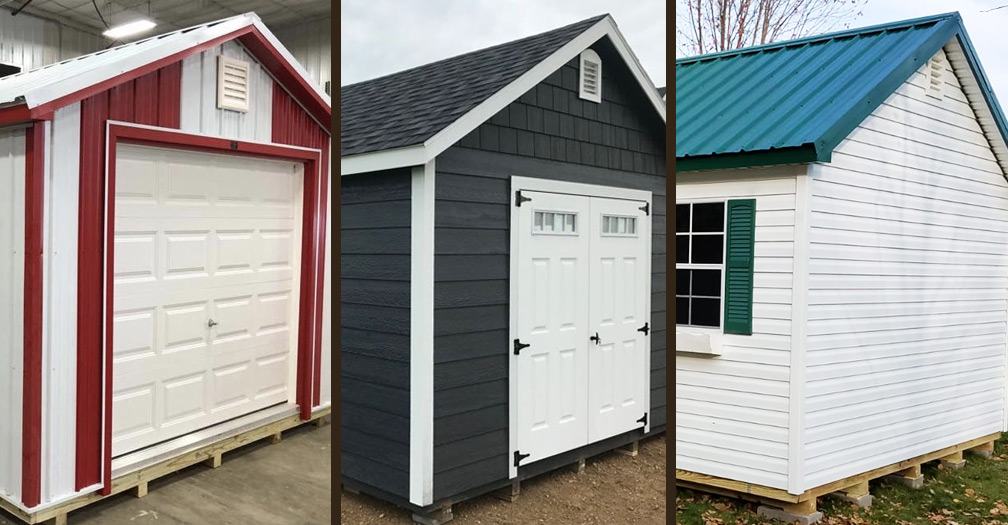Metal vs Wood vs Vinyl Sheds – Best Shed For You
You are probably wondering and undecided about what kind of shed you should purchase between metal vs wood vs vinyl sheds. We’re here to provide a wide range of materials and types to choose from. Reading this guide will help you make the best choice for an ideal shed, based on purpose and design. The type of material chosen depends on several factors such as price, maintenance and installation costs, and climate among others.
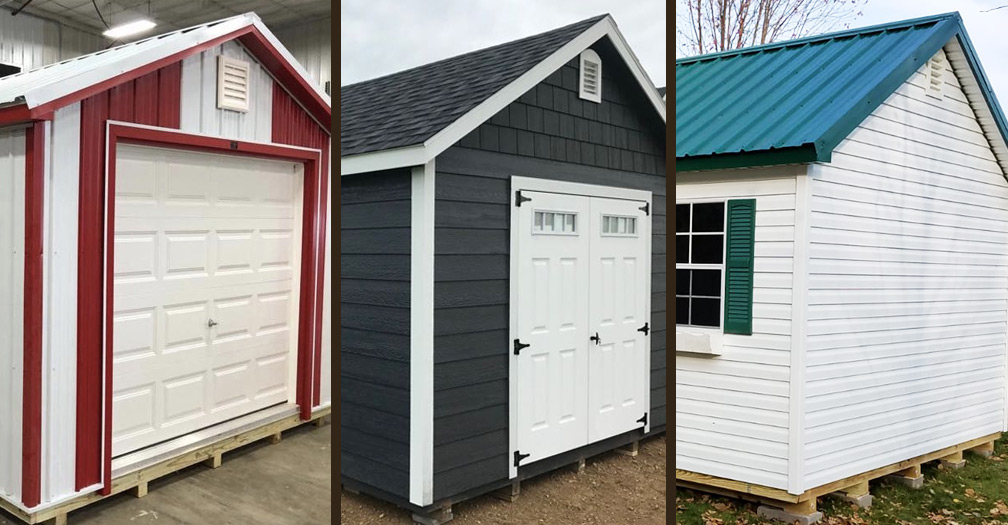
This article will discuss the strengths and weaknesses of vinyl, metal, and wooden sheds to help you pick the best shed for your exterior storage. It is important to adhere to the construction guidelines and building requirements in your area of residence.
Also Read: 9 BEST DURAMAX SHEDS FOR YOUR YARD IN 2023
What Material Should You Use for Your Shed?
The first step towards making the right shed is selecting the right material. You should choose a material that favors the shed’s conditions and purpose. Metal sheds offer great versatility and are a very good choice for making storage sheds in your backyard. They are also affordable and easy to maintain. Vinyl sheds are rust, insect, and rust-resistant, making them a good pick as well. Wood is cheap to install, but will require so much care.
Let’s take a deep dive into the pros and cons of each of these materials.
Factors to Consider When Choosing Between Vinyl, Wood, and Metal Sheds
- The shed design should match the surrounding background or adjacent buildings.
- Follow all the building codes and guidelines when building your shed. Get all the necessary permits.
- Consider your budget and build a good shed that you can afford.
- Choosing the right material can save you lots of money on energy. It can also increase longevity and save on maintenance costs.
- The size of the shad should be adequate to conveniently store and accommodate your equipment.
These are some of the key factors to consider when considering whether to use vinyl, metal, or wood for your shed. Let’s now find out which is the best material vinyl, metal, or wood for your metal shed.
Vinyl vs Metal vs Wooden Sheds
Here, we shall discuss the advantages and disadvantages of these popular building materials. Different materials are suitable for different purposes and climates. Talk to your local distributor for more personal and relevant tips.
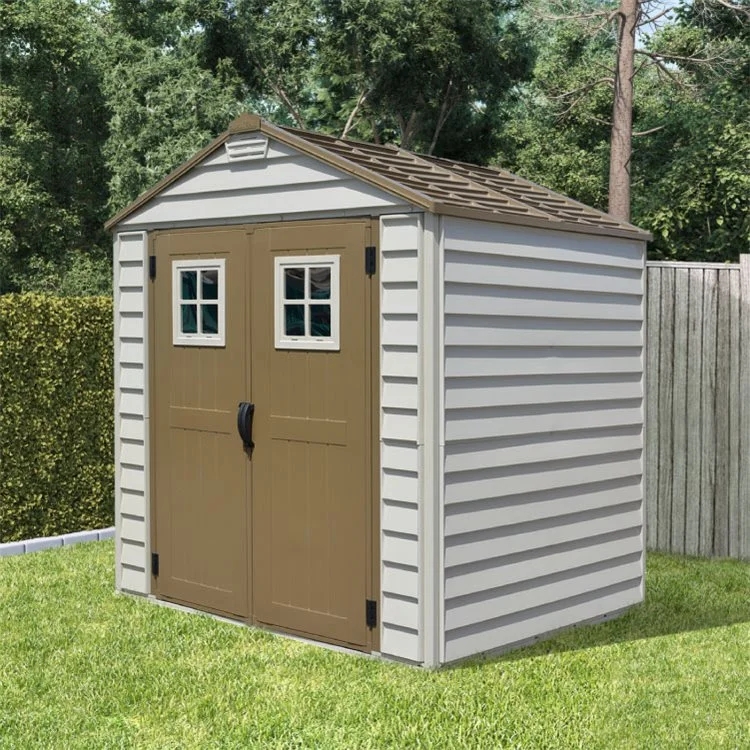
Vinyl/Plastic Sheds
Resin sheds are purposefully designed to ensure they are easy to clean, transport and install in one clean swoop. They are very easy to retain if any maintenance is required at all. Good vinyl sheets are weather and rust-resistant since they will not peel or warp. Vinyl sheets are rarely affected by insects as well.
They offer good aesthetics as vinyl sheets are also attractive. An extra plus is that vinyl sheets reduce the need for wood and are environmentally friendly. Vinyl sheets are also recyclable. We highly recommend getting DuraMaxTM vinyl sheets for all your shed-building purposes. Note that each different type of vinyl shed comes with different pros and cons as they are made from a different plastic.
Pros
- Cost efficient
- Weather and insect resistant
- Low maintenance cost
- Durable and easy to clean
- Vinyl sheds are made from fire-retardant plastic
Cons
- Must be Anchored to a base
- Can only handle the limited weight
- Costs more than metal sheds but are relatively cheaper than wooden sheds
Metal Sheds
Metal sheds are a very common choice for building sheds. They are available in several gauges of thickness and can be made of steel or galvanized Aluminium. Metal sheds are available in fewer designs and have limited features compared to vinyl and wooden sheds.
Metal sheds are cheap and long-lasting. They are fire, insect, rot, and weather-resistant compared to wooden sheds. Metal sheds must be anchored to a base, unlike wooden sheds. They are also heavy and difficult to transport. Remember, metal sheds are not rust-resistant when they come to contact with moisture. If you’re going for a metal shed, you should therefore consider a good ventilation system to increase and maintain constant airflow.
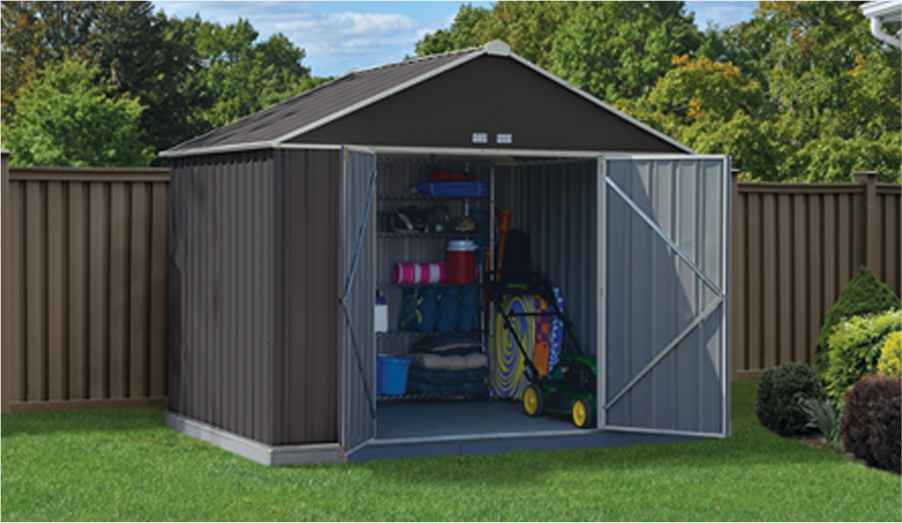
Pros
- Low maintenance costs
- Long-lasting
- Fire, rot, and insect resistant
- Visually attractive
- Easy to assemble
Cons
- Prone to rusting
- Must be anchored to a base
- Difficult to transport and customize
Wooden Sheds
These are the earliest types of sheds to ever exist. They produce rustic vintage looks and can enhance an eye-catching look for your shed. Wooden sheds are usually assembled using pressure-treated plywood and framing lumber to bring out that old-wood look. If your shed lacks siding, you’ll need to seal the exterior with a couple of coats of paint to keep the moisture and insects out. Wood like Cedar has allelochemicals that naturally act as insect repellents.
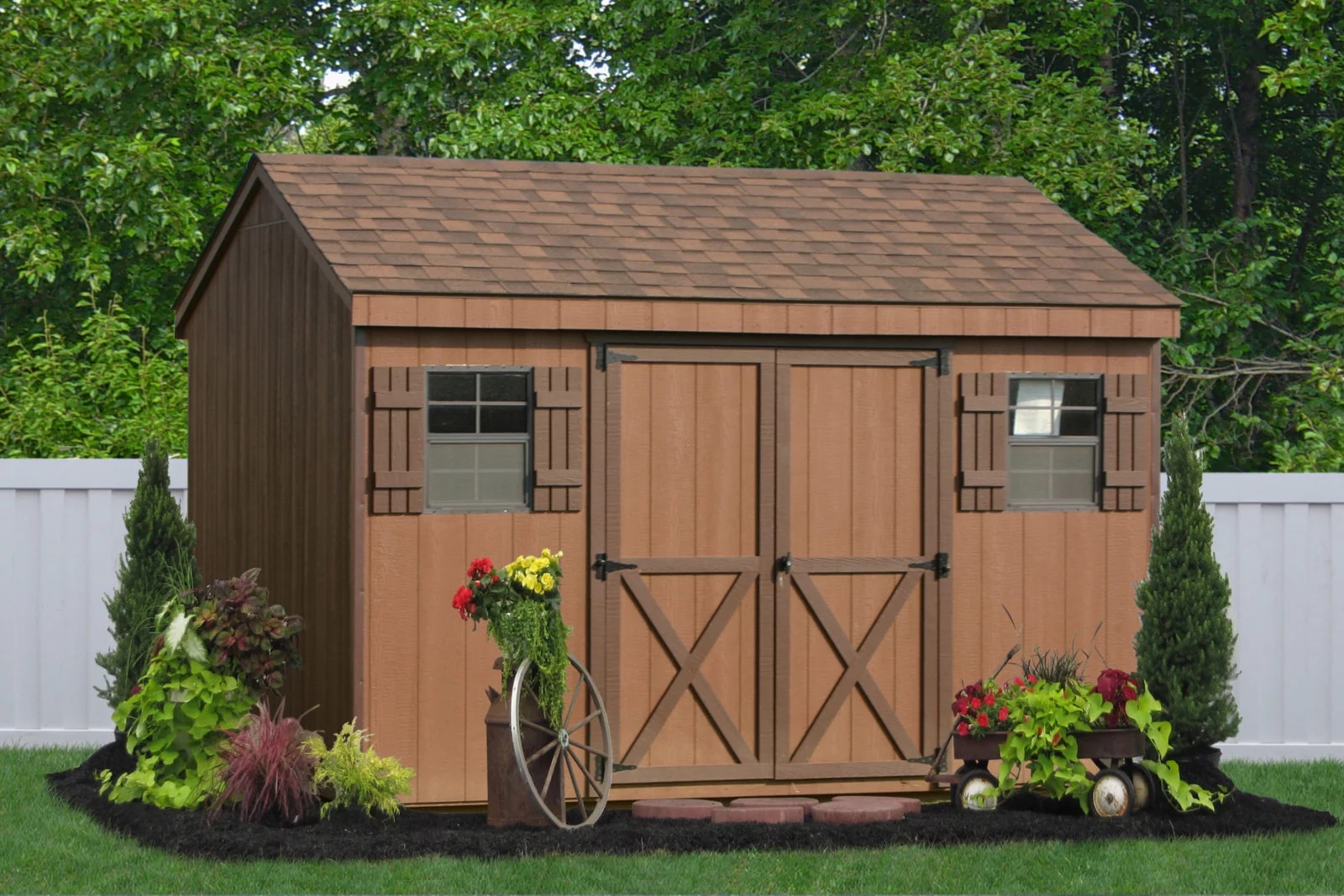
They are not insect, fire, or weather resistant. Wooden sheds are also not friendly to the environment due to the impact of weather conditions on trees. Therefore, wood sheds tend to have high maintenance costs.
Pros
- Are attractive with a wide range of designs
- Biggest range of design and size options
- Strong and durable without needing to be anchored
Cons
- Not fire, insect or weather-resistant
- High maintenance costs
- Not environment friendly
- Expensive
Tips to Prevent Rotting on Your Wooden Sheds
- Ensure your shed is built on a dry and raised platform.
- Keep debris from the yard away from the shed
- Do your painting touch-ups regularly
- If possible, shingle your roof
- Always clear snow buildup off the roof and siding
- Install rain gutters to collect runoff water from the shed
Also Read: 9 BEST DURAMAX SHEDS FOR YOUR YARD IN 2023
Wooden vs Metal vs Vinyl/Plastic Sheds – (FAQs)
Q: Which is better: a vinyl shed or a metal shed?
A: The main factor to consider when weighing the two is the purpose of the shed. Vinyl sheds are more expensive but are ideal to use in hot areas. They are also easier to transport and assemble. Metal sheds are cheaper and longer lasting. Ensure you choose the material that is suitable for your needs.
Q: What do I need to prepare before building my shed?
A: You should read the instructions and carefully research the precautions needed for the type of shed. A good example is ensuring you locate a flat surface to put your vinyl shed on. Clear the area of any rocks or debris and put down the base of the shed. In some cases, you may have to lay a foundation for your shed. The foundation can be made from pavers, wood, or concrete depending on your preference.
Q: What kinds of problems can I expect while building or maintaining my shed?
A: If not done properly and following instructions, you can run into several issues when building any type of shed. Speak with experts or carry out thorough research. Inspect your walls and check your roof constantly to spot issues on time. Leaking is a common problem associated with the roof. It is important to patch up leaks early.
Q: Are Wooden or Plastic sheds better?
A: If you are looking for a cheaper and weather-resistant shed, vinyl is the better choice. Vinyl sheds are durable and resistant to rotting, peeling, insects, rusting, fading, and warping. Vinyl is easier to maintain and assemble compared to wood. Both vinyl and wood sheets are customizable and can be adjusted to bring out the classic wood appearance. Wooden sheds are pre-assembled and don’t require anchoring to the ground.
Best Material For Building a Shed – Takeaways
All three materials get the job done and are long-lasting. Both metal and vinyl are better alternatives to wood for weather-resistant sheds that can handle the harshest weather conditions and certainly last longer. Vinyl combines the benefits of wood and the durability of metal. Vinyl is also highly recommendable because of its affordability and low maintenance costs.

